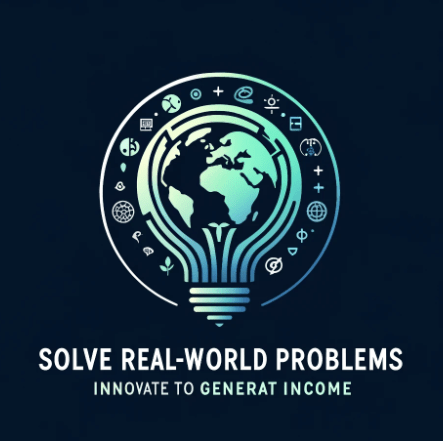Solve Real-World Problems: Innovate to Generate Income
Introduction
In today’s rapidly changing world, innovation is more than just a buzzword; it’s a crucial strategy for solving real-world problems and generating income. This approach not only benefits individuals and businesses but also contributes positively to society and the environment.
Identifying Problems
The first step in this innovative journey is to identify real-world problems that require solutions. These can range from environmental issues to inefficiencies in industries or everyday inconveniences faced by consumers.
Example:
- Environmental Issue: Excessive use of plastic packaging.
- Industry Inefficiency: High energy costs in manufacturing.
- Consumer Inconvenience: Lack of affordable, high-quality elder care services.
Developing Innovative Solutions
Once problems are identified, the next step is to brainstorm and develop innovative solutions. This involves thinking creatively, considering new technologies, and sometimes, rethinking existing business models.
Example:
- Biodegradable Packaging: Creating a startup that produces affordable, biodegradable packaging to replace plastics.
- Energy Efficient Tech: Developing a new energy-efficient technology for manufacturing processes that reduces energy consumption by 50%.
- Shared Elder Care Platform: Launching a platform that connects certified freelancers with families needing elder care, offering more affordable services with flexible schedules.
Building a Business Model
Developing a business model that supports the innovative solution is crucial. This includes figuring out how to monetize the solution, considering costs, pricing strategies, market entry, and scaling opportunities.
Example:
- Subscription Model for Packaging: Implementing a subscription service for companies to receive biodegradable packaging based on their needs, ensuring steady revenue and client retention.
- Energy Saving as a Service: Offering the new manufacturing technology on a service basis, where companies pay based on the energy they save.
- Freemium Model for Elder Care Platform: Offering basic services for free while charging for premium features like emergency elder care or specialized health monitoring.
Testing and Iterating
Before a full-scale launch, it’s essential to test the solution with real users to gather feedback and make necessary adjustments. This iterative process helps refine the product or service, ensuring it effectively solves the problems identified.
Example:
- Pilot Program for Packaging: Running a six-month pilot with a select group of companies to test the biodegradable packaging under different conditions and gather feedback.
- Prototype Testing in Factories: Installing the new technology in a small number of factories to monitor its performance and make improvements based on operational data.
- Beta Testing for Care Platform: Launching a beta version of the elder care platform in a small region to test its functionality and user interface, collecting user feedback for further refinement.
Marketing and Expansion
Once the product or service is optimized, the focus shifts to marketing and expansion. Effective marketing strategies are vital to educate potential customers about the new solution and its benefits. Expansion involves scaling the business, potentially on a global scale, to maximize impact and revenue.
Example:
- Digital Marketing Campaign: Using social media and online ads to raise awareness about the environmental benefits of the biodegradable packaging.
- Partnerships and Industry Trade Shows: Attending trade shows and forming partnerships with large manufacturers to introduce the energy-saving technology to a broader market.
- Community Building for Elder Care: Creating an online community for families using the elder care platform to share experiences and advice, enhancing customer loyalty and organic growth through word-of-mouth.
Conclusion
Innovating to solve real-world problems not only opens up numerous avenues for generating income but also contributes to societal and environmental betterment. By focusing on meaningful challenges, entrepreneurs can build sustainable businesses that offer lasting value to their customers and the world.


